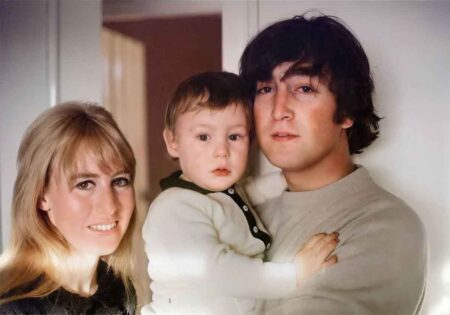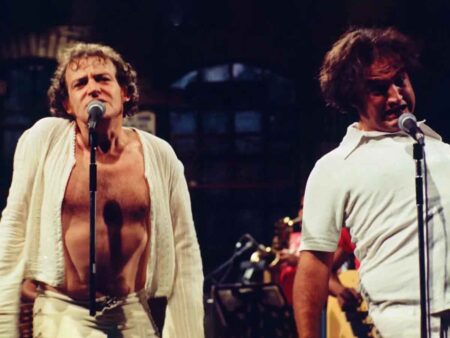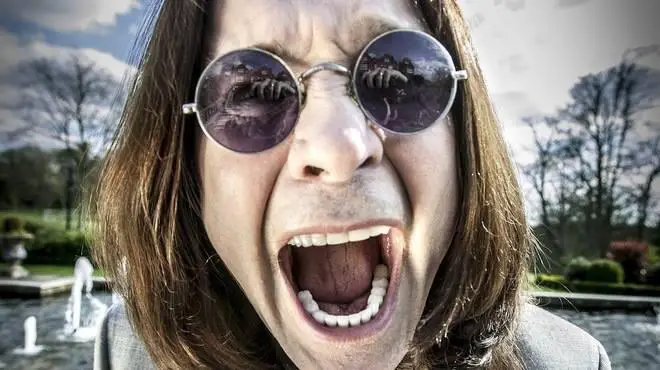At 82 years old, Paul McCartney closed out Saturday Night Live’s 50th anniversary special not with polish, but with presence. His voice cracked. His notes occasionally faltered. But what came through was far more powerful than perfection—a raw, heartfelt performance of “Golden Slumbers,” “Carry That Weight,” and “The End,” lifted straight from Abbey Road, one of the most celebrated albums in rock history.
It wasn’t flashy. It wasn’t AutoTuned. It was something rare: a legend meeting the moment with nothing but honesty, a piano, and decades of shared history between him and the audience. The result? Fans flooded social media with praise—not just for the performance, but for what it represented.
Contents
A Song Cycle of Reflection and Resilience
McCartney’s decision to perform the final suite of Abbey Road wasn’t accidental. Each track in the medley carries symbolic weight. “Golden Slumbers” offers a lullaby for lost time, a moment of soft reflection. “Carry That Weight” speaks to lifelong burdens—personal, creative, and emotional. And “The End” concludes with a sense of optimism and reconciliation: the enduring idea that “in the end, the love you take is equal to the love you make.”
Performed live in 2025, that message hit differently. For longtime fans, it wasn’t just a throwback—it was a reckoning with time, aging, and legacy. And for younger audiences, it was an introduction to what sincerity in music still looks and sounds like.
Social Media’s Emotional Chorus
What truly set the internet buzzing after the performance wasn’t just McCartney’s song choice or delivery—it was the rawness. Fans were quick to point out that in an era of pitch correction and studio-overdubs, McCartney simply sang. Imperfectly, but truthfully. One fan wrote, “Almost no big names sing this raw anymore… seeing him do it is incredible.”
Others shared snapshots of McCartney’s past, including a touching throwback photo with the late Chris Farley—adding a layer of SNL nostalgia to the night. And perhaps the most powerful reaction came from a viewer who wrote, “What an honor to be alive at the same time as Paul McCartney.”
It’s not just about the music. It’s about presence—what it means to witness a living legend still creating, still performing, still giving.
More Than a Beatle
While Abbey Road remains a landmark in McCartney’s career, it’s only part of a much larger legacy. After the Beatles disbanded in 1970, McCartney formed Wings with his wife Linda and guitarist Denny Laine. With Wings, he released hits like “Band on the Run,” “Jet,” and “Live and Let Die,” further solidifying his place in rock history. Wings wasn’t just a side project—it was a commercial and artistic success, earning multiple Grammy nominations and global chart dominance through the ’70s.
Outside of band efforts, McCartney’s solo career has been prolific. He’s composed classical music, collaborated with contemporary artists like Kanye West and Rihanna, and written the theme for Vanilla Sky. His albums McCartney III (2020) and Egypt Station (2018) reached new generations via streaming platforms while staying true to the songwriting craft he helped pioneer.
Through it all, he’s remained a working artist, constantly creating—not coasting on past glory but building on it.
The SNL Connection
McCartney’s return to Saturday Night Live wasn’t just a nod to his musical career—it was also a testament to his deep ties to the show itself. He’s appeared multiple times as both musical guest and surprise performer over the years, helping cement the cultural bond between SNL and popular music.
SNL50 was more than just a television milestone—it was a tribute to five decades of comedy, commentary, and culture. McCartney’s performance, introduced by Martin Short, underscored just how intertwined music and memory are within that history. His presence gave the event not just star power, but heart.
Time, Talent, and the Weight We All Carry
There’s something powerful about watching an artist perform songs they first recorded over half a century ago—and still mean every word. McCartney doesn’t need to prove anything. His legacy is secure, his influence undeniable. But in choosing to show up and sing without filters or fanfare, he reminded us that artistry is about connection, not perfection.
Yes, the voice is older. The phrasing slower. But what remains is the spirit that defined an era—and continues to resonate across generations.
Long Live Macca
In the end, McCartney’s SNL50 medley wasn’t about flawless vocals or flashy production. It was a quiet act of defiance in a hyper-polished age. It was a nod to the past and a message for the future: that authenticity still matters, that vulnerability is strength, and that some artists never truly fade.
For those who watched—whether they’ve followed him since Love Me Do or discovered him through Now and Then—this performance wasn’t just a celebration. It was a gift. And it’s not every day you get to say: we were here for this.
You can check out the video here:




